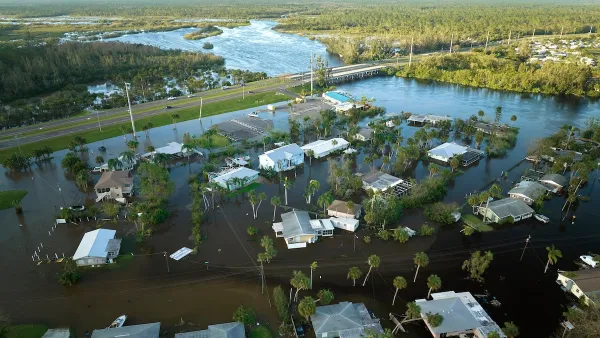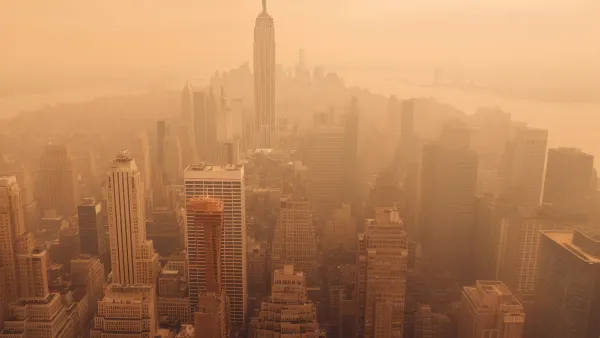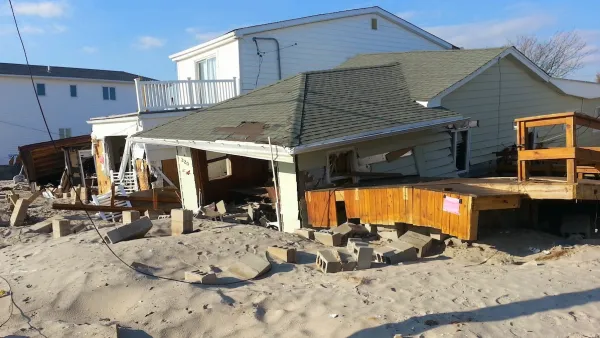Houston headlined the news of flooding this week, but swollen rivers rushed over their banks and onto roads and into homes all over the state of Texas this week. Is the state's infrastructure resilient enough for the effects of a changing climate?
"Over the Memorial Day weekend widespread flooding occurred in at least eight counties in Texas, which include the cities of Austin, Dallas, San Antonio, and Houston. These floods have brought a tragic loss of life and are forcing families from their homes," writes Rob Moore to set the stage for an examination of climate change preparations in the state of Texas.
Moore notes that Texas is particularly susceptible to flooding, averaging $254 million in damages a year. However, this week's floods could indicate that worse conditions are still to come.
"Climate projections indicate that Texans will increasingly live at the extremes, enduring long periods of drought and water scarcity, interspersed with episodes of intense storms that cause the kinds of flash flooding Texans have been enduring this week. With the additional risk of hurricanes and sea-level rise, climate change is going to make Texas increasingly vulnerable to natural disasters."
Moore notes how many in the Texas congressional representation are on the record in denying climate change. The state's policies reflect that denial: the state's 2013 official hazard mitigation plan, required to qualify the state for disaster funds from FEMA, does not acknowledge how climate change will impact the frequency and severity of natural disasters. (A new federal policy requires hazard mitigation plans to include climate change, but the state is not due for a new plan until 2018, according to Moore.) Meanwhile, "repetitive loss properties" have racked up $1 billion payments from the National Flood Insurance Program.
Moore does, however, acknowledge that 29 counties in the state "have adopted more stringent flood protection standards than required by the National Flood Insurance Program." Those Texas counties could provide a model for the rest of the state and the country, but despite the Obama Administration's desires to raise those standards, "members of Congress are intent on blocking these important public safety standards."
FULL STORY: Texas Floods Illustrate the Need to Plan for Climate Change

National Parks Layoffs Will Cause Communities to Lose Billions
Thousands of essential park workers were laid off this week, just before the busy spring break season.

Retro-silient?: America’s First “Eco-burb,” The Woodlands Turns 50
A master-planned community north of Houston offers lessons on green infrastructure and resilient design, but falls short of its founder’s lofty affordability and walkability goals.

Delivering for America Plan Will Downgrade Mail Service in at Least 49.5 Percent of Zip Codes
Republican and Democrat lawmakers criticize the plan for its disproportionate negative impact on rural communities.

Test News Post 1
This is a summary

Test News Headline 46
Test for the image on the front page.

Balancing Bombs and Butterflies: How the National Guard Protects a Rare Species
The National Guard at Fort Indiantown Gap uses GIS technology and land management strategies to balance military training with conservation efforts, ensuring the survival of the rare eastern regal fritillary butterfly.
Urban Design for Planners 1: Software Tools
This six-course series explores essential urban design concepts using open source software and equips planners with the tools they need to participate fully in the urban design process.
Planning for Universal Design
Learn the tools for implementing Universal Design in planning regulations.
EMC Planning Group, Inc.
Planetizen
Planetizen
Mpact (formerly Rail~Volution)
Great Falls Development Authority, Inc.
HUDs Office of Policy Development and Research
NYU Wagner Graduate School of Public Service





























